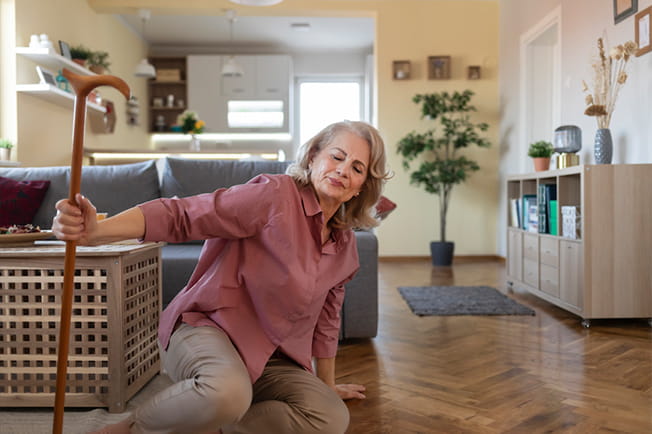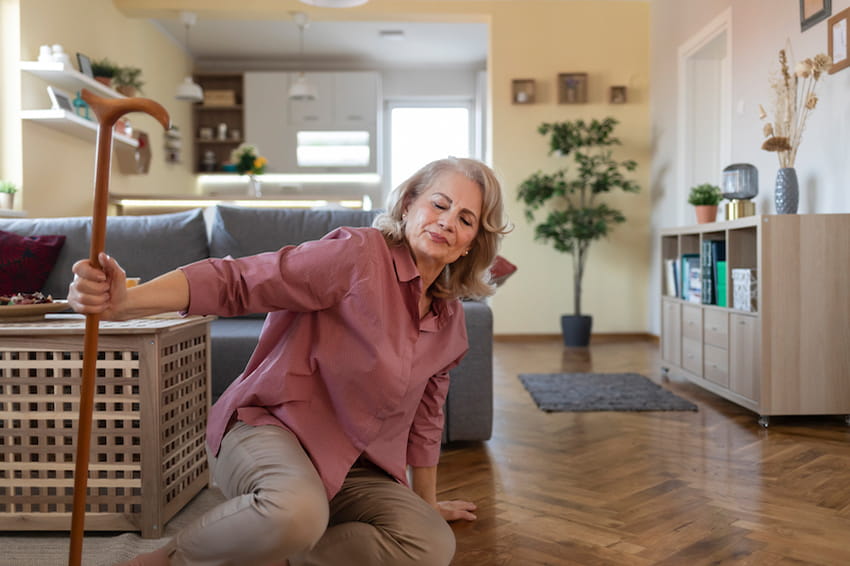Implement these fall prevention tips now to keep yourself safe

An older adult—defined as someone over 65 years of age—falls every second of every day in the United States, according to the Centers for Disease Control (CDC). Falls can cause broken bones like wrists, ankles and hips, or may cause serious head injuries, which can be especially dangerous if the person is taking blood-thinning medication (anticoagulant). When someone falls, it often leads to a fear of falling again. This creates greater anxiety and withdrawal from certain daily activities, which in turn increases risk of falling.

There are an astounding 36 million falls per year in older people resulting in 32,000 deaths from such falls. Most of these falls occur inside or immediately outside of the home and are often preventable. Although falls are common, they are not a normal part of aging.
Take a moment to understand your risk factors for falling and consider these fall prevention tips to keep yourself and loved ones safe at home.
What are my risk factors for falling at home?
You are at greater risk for falling at home if you have certain medical conditions, such as:
Falls are the #1 cause of injury-related deaths in older adults.
Your risk factors for falling at home also increase if you are someone who tires easily or if you have any of the following:
- Changes in vision
- Hearing loss
- Osteoporosis
- Joint pain
- Lower body weakness, leg/foot weakness, or other changes in sensation
Taking more than three medications1 also puts you at higher risk so it's particularly important to know and understand the common side effects of each medication you're taking, and to always consult your physician before taking any herbal or over-the-counter medication. If you're taking multiple medications, discuss your falls risk with your physician.
Fall prevention tips for at-home safety
Taking stock of your environment can help reduce your risk for falls. To avoid a nasty spill, give your house a safety makeover:
- Improve the lighting throughout your home. Use motion sensor lights in your driveway and doorway. This way you won't jeopardize your safety while fumbling around for keys, door handles and light switches. Keep your stairwells well-lit as well. You can purchase eco-friendly, plug-in nightlights that use very little electricity and will keep your path lit at all times.
- Install handles, grab bars and railings. Make simple modifications by installing banisters and handrails on stairs. Arrange household furniture in ways that support your movements. Place items you commonly use within arm's reach to minimize the need for climbing on a step stool. Keep in mind that the bathroom can be a particularly dangerous area—especially when the floor or your feet are wet—so installing grab bars in the bathroom is a must. Avoid locking the bathroom door and always have a way to call for help when in the bathroom. You may also want to purchase a shower chair or bench.
- Clear your floors and hallways of clutter. Inside your home, make sure you have clear pathways for walking by removing clutter and moving furniture toward the walls and out of walkways.
- Secure your mats and rugs. Throw rugs and carpet runners should be removed or secured with tape or a non-skid mat underneath. Do the same in your bathroom, ensuring you have a slip-preventing bathmat in your bath or shower as well as a secure mat to step onto when you come out.
- Fix uneven terrain. Outside your house, take note of any tripping hazards like sidewalk cracks or holes and have these areas fixed or smoothed over. If you're not able to fix the problem areas, choose a safer path. Be sure to treat icy or snowy sidewalks and take extra care when walking outdoors in winter.
Another great (and fun) way to reduce your risk of falling is to stay active. Exercise can improve your strength, cardiac fitness, balance and reaction times. There are exercise programs designed to fit every level of fitness, from walking programs to gym classes to chair aerobics. Ask a health care provider for recommendations for community fitness programs or DVD workouts you can use at home. You may also be interested in Main Line Health's fall prevention programs.
Main Line Health Senior Care Line is a free resource connecting callers with health care services and community organizations. Call 484.580.1234.
What to do if I fall at home?
Despite your best efforts, falls can still happen. The first step in recovering from a fall is to stay calm. If you feel dizzy or confused, or if you've hit your head or believe you are injured in any way, call 911 immediately.
It may also be a good idea to have a family member or neighbor who can call and check on you at a set time each day and who knows they should call for help if they don't hear from you.
If you live alone or are alone in the house for any part of the day, you need a way to call for help in case you are unable to get up from a fall. Discuss your options and the easiest way for you to communicate with friends, family members or caregivers whether via phone, mobile phone that you can keep in your pocket, or medical alert system that you can wear as a necklace or bracelet. Some systems can automatically detect a fall and send help even if you're unable to press the button, in case you're you've lost consciousness or are experiencing confusion.
It may also be a good idea to have a family member or neighbor who can call and check on you at a set time each day and who knows they should call for help if they don't hear from you.
Knowing your risk factors, making home modifications, and staying active are the top fall prevention tips for keeping yourself and loved ones safe at home. It's important to discuss any concerns with your doctors and other health care providers. And make sure you have a way to call for help if you do fall. Hopefully you'll never need it, but it's always a good idea to have a plan.
Trouble keeping your balance?
Vestibular therapy at Bryn Mawr Rehab gives patients the tools to successfully manage their balance problems and symptoms such as feeling dizzy or woozy. For an outpatient vestibular therapist near you, call 484.596.5000.
Curry Durborow is a physical therapist at Bryn Mawr Rehab Hospital.
1Ziere G., Dieleman J., Hofman A., et al. Polypharmacy and falls in the middle age and elderly population. Br J Clin Pharmacol. 2006. 61:218–223.
 Content you want, delivered to your inbox
Content you want, delivered to your inbox
Want to get the latest health and wellness articles delivered right to your inbox?
Subscribe to the Well Ahead Newsletter.
